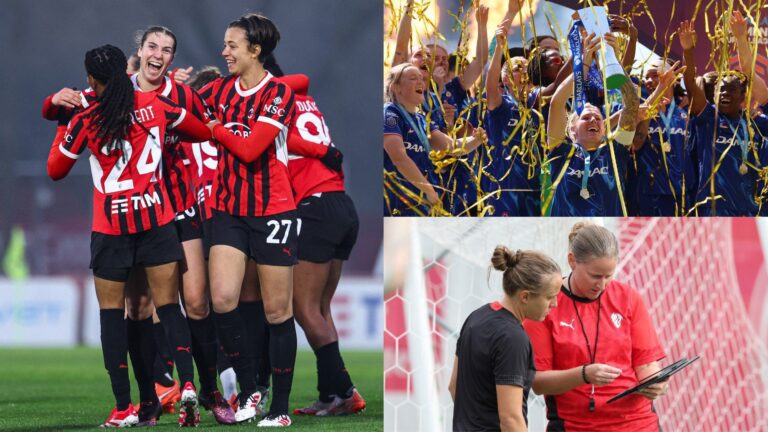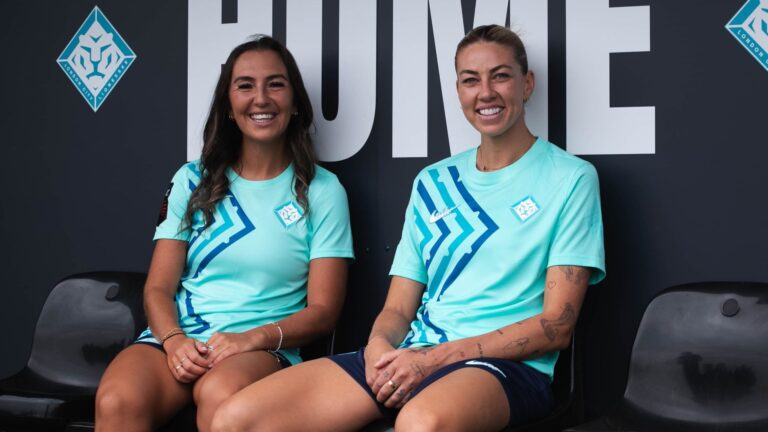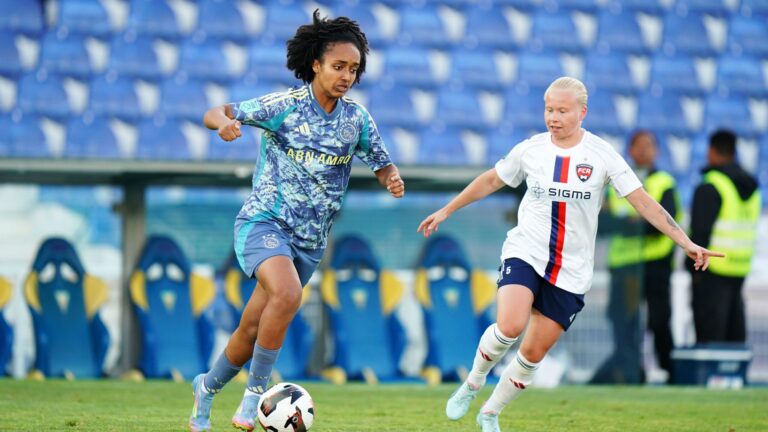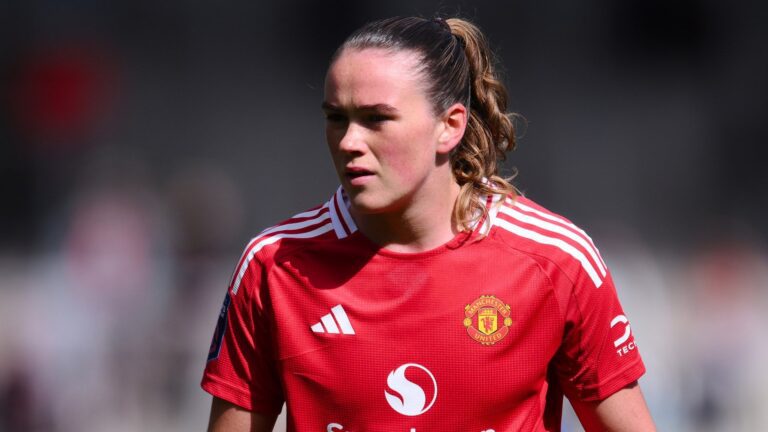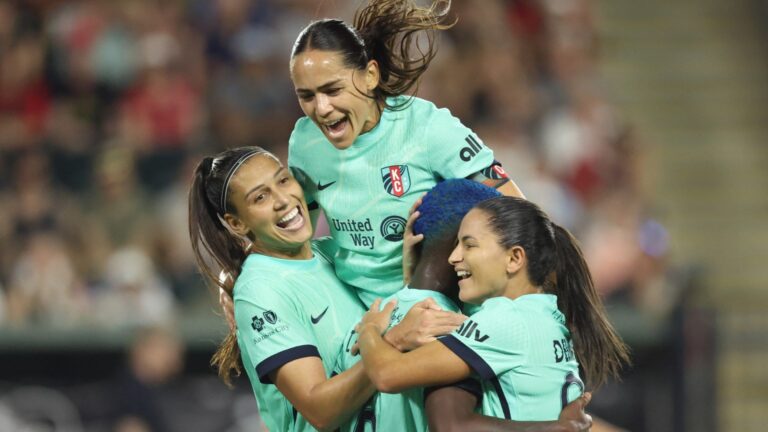Barcelona Women’s Team: Battling Financial Challenges While Maintaining Dominance
Over recent seasons, Barcelona women’s team has stood as a beacon of triumph in Spanish football, starkly contrasting the struggles of the men’s squad amid ongoing economic difficulties. This powerhouse has advanced to the last five Champions League finals, clinching victory in three, establishing itself as the leading force in women’s football in Spain. Meanwhile, the men’s team has been bogged down by fiscal woes, constantly addressing budgetary crises that hinder their push back to European prominence.
The images below capture the essence of Barcelona’s ongoing journey amidst these challenges:






Financial Pressures Creeping into Women’s Football Success
In Catalonia, a major topic of discussion lately revolves around player eligibility, echoing past frustrations. Head coach Hansi Flick expressed clear disappointment over the uncertain status of players like Marcus Rashford and Joan Garcia right up to the season’s outset, noting parallels to the previous year when matters were settled just before the first La Liga match.
The Shift in Team Dynamics
Historically, the women’s squad, known as Barca Femeni, has sidestepped the financial pitfalls that have plagued other parts of the club. Yet, recent developments indicate this insulation is fading, with the current off-season highlighting how budgetary constraints are now influencing this dominant outfit’s performance across multiple competitions in the upcoming 2025-26 season.
Club-Wide Implications of Financial Regulations
The recent press briefing involving Xavier O’Callaghan, head of professional sports, underscores the broad effects of Financial Fair Play (FFP) rules on Barcelona’s various teams. La Liga’s guidelines consider the club’s entire portfolio, which has previously disadvantaged other divisions, much like the case a couple of years ago when the basketball team parted ways with star player Nikola Mirotic due to budget restrictions.
At that time, club president Joan Laporta emphasized the need to adhere to a viability plan submitted to La Liga, necessitating cuts across sections. O’Callaghan reiterated the club’s stance, stating, “We’d prefer independent financial controls for each sport, but we have to work within the current framework.”
Recent Departures and Budget Adjustments
This summer marked a turning point for the women’s team, as it faced scrutiny under these financial limits. O’Callaghan disclosed that the club’s overall wage expenditure surpassed its allocation by €7 million, prompting widespread reductions. Consequently, several key players exited: Ellie Roebuck and Fridolina Rolfo mutually agreed to leave for Aston Villa and Manchester United, respectively, while Ingrid Engen moved to Lyon after her contract ended. On the incoming side, the club sold five young talents, with Jana Fernandez’s transfer to London City Lionesses drawing significant attention.
What’s particularly concerning is the minimal reinforcements, with only one new addition-Laia Aleixandri, returning on a free transfer from Manchester City after her academy days. This has left the squad appearing under-resourced, especially for a team aiming to compete fiercely in all tournaments. Despite a slight budget increase of €1 million for the women’s section, O’Callaghan pointed out the escalating market costs, advising a greater reliance on homegrown players.
Leveraging Youth Development as a Strength
Amid these challenges, Barcelona’s youth system remains a standout asset, complemented by established stars such as Alexia Putellas, Aitana Bonmati, and Caroline Graham Hansen. The club has evolved into a global leader in nurturing female talent through expanded programs at La Masia.
Emerging Stars Ready to Shine
Recent updates show promising figures like Sydney Schertenleib continuing to make impacts, and others such as Emilia Szymczak gaining international exposure, including her full participation in Euro 2025 for Poland. Similarly, Celia Segura and Clara Serrajordi were instrumental in Spain’s Under-19 European Championship win, highlighting a robust pipeline that could provide vital depth. For instance, with players like Cata Coll, Ona Batlle, and Claudia Pina approaching contract expirations, prioritizing renewals is crucial to maintaining competitiveness.
Sports director Marc Vives is focusing on securing extensions for core players, ensuring the club can navigate these financial tightropes. Yet, as teams in England and France, like Chelsea and Lyon, continue to pour resources into their squads-evidenced by record-breaking transfers such as Arsenal‘s acquisition of Olivia Smith-Barcelona enters the season with limitations that could test their resilience.
Overcoming Adversity for Continued Excellence
While Barcelona’s lineup still boasts world-class talent, the depth issues raise concerns about sustaining success across four fronts. Recent statistics indicate that teams with deeper benches have an edge in injury-prone seasons, making this a critical area for improvement. Ultimately, as the only financially independent section of the club, the women’s team must adapt to these economic realities to rebound from their Champions League final loss and pursue further glory.
Understanding Barcelona’s Financial Challenges
Barcelona’s women’s team has been a force in women’s football, consistently dominating domestic and European competitions. However, the club’s broader financial troubles are putting immense pressure on sustaining this success. With the men’s team grappling with debt and salary cap restrictions imposed by La Liga, resources for the women’s side are being stretched thin. Keywords like “financial challenges in women’s football” highlight how clubs worldwide are facing similar issues, but Barcelona’s situation is particularly acute due to its high-profile status.
These economic constraints have led to tough decisions, such as potential player sales and budget reallocations. For instance, the club has had to navigate the fallout from the Super League fallout and the ongoing effects of the COVID-19 pandemic, which amplified revenue losses. This has forced Barcelona to prioritize investments, often at the expense of the women’s team, raising questions about whether “Barcelona women’s team dominance” can continue uninterrupted.
Key Impacts on Team Operations
The ripple effects of these financial woes are evident in daily operations. Squad depth could suffer if key players like Aitana Bonmatí or Alexia Putellas face uncertain futures due to contract renegotiations or transfers. According to recent reports, Barcelona has already sold promising talents to balance the books, which directly affects team morale and performance in tournaments like the UEFA Women’s Champions League.
Moreover, infrastructure investments, such as training facilities, might be delayed. This could hinder the development of young talents, a cornerstone of Barcelona’s strategy. Fans and analysts are watching closely to see if these “tough decisions on the women’s team” will lead to a dip in competitiveness or spark innovative adaptations.
Historical Dominance and Its Foundation
Barcelona’s women’s team has built an impressive legacy, winning multiple Liga F titles and Champions League crowns since 2019. This dominance stems from a mix of world-class talent, strategic youth development, and strong fan support. However, sustaining this requires ongoing investment in scouting and player welfare, areas now threatened by financial pressures.
Experts point to the team’s academy as a success story, producing stars who embody “sustaining success in women’s football.” Yet, without adequate funding, the pipeline could dry up, making it harder to compete against well-funded rivals like Lyon or Chelsea. The challenge lies in balancing short-term financial survival with long-term goals.
Lessons from Similar Scenarios
Looking at other clubs provides valuable context. For example, during Manchester United’s financial restructuring, their women’s team saw reduced transfer activity, yet they maintained competitiveness through shrewd loan deals and youth promotions. This shows that while financial challenges are common, strategic planning can mitigate impacts.
Case Studies: Lessons from Other Clubs
Delving into case studies reveals how clubs have navigated similar waters. Take Olympique Lyon’s women’s team, which faced funding cuts in the early 2010s but bounced back by forging commercial partnerships and focusing on global marketing. Their approach to “women’s football dominance amid financial constraints” involved diversifying revenue streams, such as merchandise sales and international tours, which helped stabilize operations.
Another example is Arsenal’s women’s team in the UK, which dealt with ownership changes and budget cuts by emphasizing community engagement and sponsorships. These case studies demonstrate that clubs can emerge stronger by viewing financial challenges as opportunities for innovation, offering a blueprint for Barcelona.
Benefits of Adapting to Financial Pressures
Adopting a resilient strategy brings several benefits, such as fostering greater team unity and attracting sponsors who value accountability. For Barcelona, this could mean enhanced global appeal, as overcoming these hurdles might inspire more fans and partnerships in the growing market of women’s football. Benefits include cost-effective talent development and improved fan loyalty, turning potential weaknesses into strengths for “sustaining dominance in women’s football.”
By reallocating resources wisely, the club could invest in data analytics for player performance, ensuring that every euro spent maximizes on-field results. This adaptive mindset not only preserves competitive edge but also sets a positive example for emerging women’s leagues worldwide.
Practical Tips for Barcelona’s Management
To navigate these challenges, here are some practical tips based on industry best practices:
- Diversify Revenue Sources: Explore new sponsorship deals and merchandise lines specifically for the women’s team to reduce dependency on the men’s side.
- Focus on Youth Development: Prioritize the academy system, as it’s a low-cost way to build depth and reduce transfer fees.
- Leverage Partnerships: Collaborate with global brands or federations for joint initiatives, like training camps or exhibitions, to boost visibility and funds.
- Optimize Squad Management: Use data-driven decisions for contracts and rotations, ensuring key players are retained without breaking the bank.
- Engage Fans Actively: Launch community programs and social media campaigns to increase attendance and donations, directly supporting the team’s finances.
These tips can help Barcelona maintain its edge while addressing financial realities.
First-Hand Experiences from the Football World
Insights from players and coaches provide real-world perspectives. Former Barcelona player Vicky Losada has shared in interviews how financial instability affected team dynamics, emphasizing the need for transparent communication from management. Similarly, coach Jonatan Giráldez has spoken about adapting tactics with a smaller budget, focusing on versatility to keep the team competitive.
These first-hand experiences underscore the human side of “financial challenges forcing tough decisions,” reminding us that while numbers drive decisions, the passion of the game keeps spirits high. By learning from these stories, Barcelona can foster a culture of resilience that sustains its dominance.


